An ontology for commitments in MAS
言行皆是正道路的英语作文

In the realm of human conduct,the essence of integrity and righteousness is paramount.The principle that ones actions and words should be aligned with the path of righteousness is a timeless guideline that has been upheld across various cultures and societies.This essay aims to explore the significance of adhering to a life of integrity and the impact it has on individuals and communities.To begin with,the concept of righteousness is deeply rooted in moral philosophy.It is the quality of being morally right and just,often associated with honesty,fairness,and a strong sense of ethics.When ones words and actions are in harmony with the principles of righteousness,it reflects a commitment to truth and justice,which are fundamental to the functioning of a healthy society.Integrity,on the other hand,is the quality of being honest and having strong moral principles.It is the adherence to ones beliefs and values,even in the face of adversity or temptation.When individuals demonstrate integrity,they inspire trust and respect from others,which are crucial for building strong relationships and fostering a sense of community.The alignment of ones words and actions with the path of righteousness is not merely a personal virtue but also a social responsibility.It is through our actions that we can influence others and contribute to the betterment of society.By setting an example of righteousness,we can inspire others to follow suit,creating a ripple effect of positive change.Moreover,living a life of integrity and righteousness has profound psychological benefits. It promotes selfrespect and selfesteem,as individuals feel confident in their moral standing and decisions.This,in turn,contributes to a sense of inner peace and contentment,as one is at ease with their conscience and actions.However,the path of righteousness is not always easy to navigate.It requires courage and resilience in the face of challenges and temptations.It demands that individuals stand up for their beliefs and values,even when it is difficult or unpopular.This can be a daunting task,but the rewards of living a life of integrity far outweigh the challenges.In conclusion,the importance of aligning ones words and actions with the path of righteousness cannot be overstated.It is a cornerstone of personal development,social harmony,and moral progress.By embracing integrity and righteousness,we can not only elevate ourselves but also contribute to a more just and compassionate world.It is a journey worth undertaking,for the sake of our own wellbeing and that of future generations.。
是什么样的决心英语作文

In the realm of English composition,the term resolution can be approached from various angles,depending on the context and the specific theme of the essay.Here are several aspects that could be explored when writing an essay on resolution:1.Personal Growth and SelfImprovement:Discuss how making a resolution can be a pivotal moment in ones life,leading to personal growth and selfimprovement.For example,a resolution to exercise more can lead to better physical health and mental wellbeing.2.Overcoming Challenges:Elaborate on how resolutions can be a tool for overcoming obstacles and challenges.This could include setting a resolution to learn a new skill,face a fear,or tackle a difficult task.3.The Power of Commitment:Explore the idea that the act of making a resolution is a demonstration of commitment.Discuss the importance of following through on a resolution and the benefits of maintaining that commitment.4.Cultural and Social Aspects:Discuss how resolutions are not just personal but can also be cultural or societal.For instance,New Years resolutions are a common practice worldwide,reflecting collective aspirations for a better future.5.The Role of Goals:Analyze the role that setting goals,such as resolutions,plays in achieving success.Discuss the process of goal setting,the importance of SMART goals Specific,Measurable,Achievable,Relevant,Timebound,and how they can guide ones actions.6.The Psychological Impact:Delve into the psychological aspects of making resolutions, including the motivation behind them,the satisfaction of achieving them,and the potential for disappointment if they are not met.7.Strategies for Success:Offer practical advice on how to make and keep resolutions. This could include setting realistic expectations,breaking down larger goals into smaller steps,and finding support systems.8.Reflection and Evaluation:Encourage readers to reflect on their past resolutions and evaluate what worked and what didnt.Discuss the importance of learning from past experiences to improve the chances of success in future resolutions.9.The Impact of Failure:Address the topic of failure in the context of resolutions. Discuss how failure can be a stepping stone to success,providing valuable lessons andinsights for future attempts.10.Inspirational Stories:Share stories of individuals who have successfully achieved their resolutions,inspiring readers to believe in their own ability to make and keep resolutions.When writing an essay on resolution,its important to choose a clear focus and provide concrete examples to support your arguments.Whether youre discussing the personal impact of resolutions or their broader implications,a wellstructured and thoughtful essay can provide valuable insights into the power of setting and achieving goals.。
What is an Ontology

What is an Ontology?Tom Gruber <gruber@>Short answer:An ontology is a specification of a conceptualization.The word "ontology" seems to generate a lot of controversy in discussions about AI. It has a long history in philosophy, in which it refers to the subject of existence. It is also often confused with epistemology, which is about knowledge and knowing.In the context of knowledge sharing, I use the term ontology to mean a specification of a conceptualization. That is, an ontology is a description (like a formal specification of a program) of the concepts and relationships that can exist for an agent or a community of agents. This definition is consistent with the usage of ontology asset-of-concept-definitions, but more general. And it is certainly a different sense of the word than its use in philosophy.What is important is what an ontology is for. My colleagues and I have been designing ontologies for the purpose ofenabling knowledge sharing and reuse. In that context, an ontology is a specification used for making ontological commitments. The formal definition of ontological commitment is given below. For pragmetic reasons, we choose to write an ontology as a set of definitions of formal vocabulary. Although this isn't the only way to specify a conceptualization, it has some nice properties for knowledge sharing among AI software (e.g., semantics independent of reader and context). Practically, an ontological commitment is an agreement to use a vocabulary (i.e., ask queries and make assertions) in a way that is consistent (but not complete) with respect to the theory specified by an ontology. We build agents that commit to ontologies. We design ontologies so we can share knowledge with and among these agents.This definition is given in the article:T. R. Gruber. A translation approach to portable ontologies. Knowledge Acquisition, 5(2):199-220, 1993. Available on line.A more detailed description is given inT. R. Gruber. Toward principles for the design of ontologies used for knowledge sharing. Presented at the Padua workshopon Formal Ontology, March 1993, to appear in an edited collection by Nicola Guarino. Available online.With an excerpt attached.Ontologies as a specification mechanismA body of formally represented knowledge is based on a conceptualization: the objects, concepts, and other entities that are assumed to exist in some area of interest and the relationships that hold among them (Genesereth & Nilsson, 1987) . A conceptualization is an abstract, simplified view of the world that we wish to represent for some purpose. Every knowledge base, knowledge-based system, or knowledge-level agent is committed to some conceptualization, explicitly or implicitly.An ontology is an explicit specification of a conceptualization. The term is borrowed from philosophy, where an Ontology is a systematic account of Existence. For AI systems, what "exists" is that which can be represented. When the knowledge of a domain is represented in a declarative formalism, the set of objects that can be represented is called the universe of discourse. This set of objects, and thedescribable relationships among them, are reflected in the representational vocabulary with which a knowledge-based program represents knowledge. Thus, in the context of AI, we can describe the ontology of a program by defining a set of representational terms. In such an ontology, definitions associate the names of entities in the universe of discourse (e.g., classes, relations, functions, or other objects) with human-readable text describing what the names mean, and formal axioms that constrain the interpretation and well-formed use of these terms. Formally, an ontology is the statement of a logical theory.[1]We use common ontologies to describe ontological commitments for a set of agents so that they can communicate about a domain of discourse without necessarily operating on a globally shared theory. We say that an agent commits to an ontology if its observable actions are consistent with the definitions in the ontology. The idea of ontological commitments is based on the Knowledge-Level perspective (Newell, 1982) . The Knowledge Level is a level of description of the knowledge of an agent that is independent of the symbol-level representation used internally by the agent. Knowledge is attributed to agents by observing their actions; an agent "knows" something if it actsas if it had the information and is acting rationally to achieve its goals. The "actions" of agents---including knowledge base servers and knowledge-based systems--- can be seen through a tell and ask functional interface (Levesque, 1984) , where a client interacts with an agent by making logical assertions (tell), and posing queries (ask).Pragmatically, a common ontology defines the vocabulary with which queries and assertions are exchanged among agents. Ontological commitments are agreements to use the shared vocabulary in a coherent and consistent manner. The agents sharing a vocabulary need not share a knowledge base; each knows things the other does not, and an agent that commits to an ontology is not required to answer all queries that can be formulated in the shared vocabulary.In short, a commitment to a common ontology is a guarantee of consistency, but not completeness, with respect to queries and assertions using the vocabulary defined in the ontology. Notes[1] Ontologies are often equated with taxonomic hierarchies of classes, but class definitions, and the subsumptionrelation, but ontologies need not be limited to these forms. Ontologies are also not limited to conservative definitions, that is, definitions in the traditional logic sense that only introduce terminology and do not add any knowledge about the world (Enderton, 1972) . To specify a conceptualization one needs to state axioms that do constrain the possible interpretations for the defined terms.。
承诺作文模板素材积累

承诺作文模板素材积累英文回答:The Importance of Commitment。
Commitment is a key ingredient for success in all aspects of life. It is the willingness to stay dedicated to a goal or task, even when faced with challenges or setbacks. People who are committed are more likely to achieve their goals because they are not easily discouraged.There are many ways to show commitment. One way is to simply stick to a plan. When you make a commitment, it is important to follow through with it. This means doing what you said you would do, even when it is difficult or inconvenient.Another way to show commitment is to be persistent. When you encounter obstacles, it is important to keep trying. Do not give up easily. The more persistent you are,the more likely you are to overcome challenges and achieve your goals.Commitment is also important for building relationships. When you are committed to a relationship, it means that you are willing to work through the tough times. You arewilling to forgive your partner's mistakes and you arewilling to compromise. Commitment is essential for any healthy long-term relationship.In conclusion, commitment is a vital ingredient for success in life. It is the willingness to stay dedicated to a goal or task, even when faced with challenges or setbacks. People who are committed are more likely to achieve their goals and build lasting relationships.中文回答:承诺的重要意义。
产生压力的英语作文
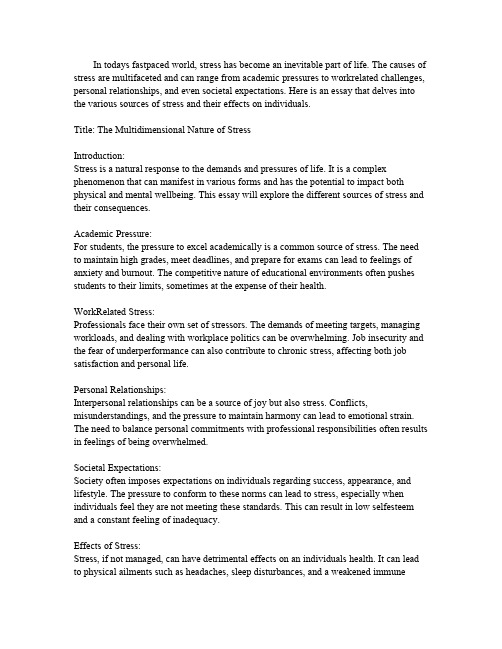
In todays fastpaced world,stress has become an inevitable part of life.The causes of stress are multifaceted and can range from academic pressures to workrelated challenges, personal relationships,and even societal expectations.Here is an essay that delves into the various sources of stress and their effects on individuals.Title:The Multidimensional Nature of StressIntroduction:Stress is a natural response to the demands and pressures of life.It is a complex phenomenon that can manifest in various forms and has the potential to impact both physical and mental wellbeing.This essay will explore the different sources of stress and their consequences.Academic Pressure:For students,the pressure to excel academically is a common source of stress.The need to maintain high grades,meet deadlines,and prepare for exams can lead to feelings of anxiety and burnout.The competitive nature of educational environments often pushes students to their limits,sometimes at the expense of their health.WorkRelated Stress:Professionals face their own set of stressors.The demands of meeting targets,managing workloads,and dealing with workplace politics can be overwhelming.Job insecurity and the fear of underperformance can also contribute to chronic stress,affecting both job satisfaction and personal life.Personal Relationships:Interpersonal relationships can be a source of joy but also stress.Conflicts, misunderstandings,and the pressure to maintain harmony can lead to emotional strain. The need to balance personal commitments with professional responsibilities often results in feelings of being overwhelmed.Societal Expectations:Society often imposes expectations on individuals regarding success,appearance,and lifestyle.The pressure to conform to these norms can lead to stress,especially when individuals feel they are not meeting these standards.This can result in low selfesteem and a constant feeling of inadequacy.Effects of Stress:Stress,if not managed,can have detrimental effects on an individuals health.It can lead to physical ailments such as headaches,sleep disturbances,and a weakened immunesystem.Mentally,it can result in anxiety,depression,and a decline in cognitive function. Conclusion:Understanding the sources of stress is the first step towards managing it effectively.It is crucial for individuals to recognize the signs of stress and take proactive measures to mitigate its impact.This can include adopting healthy lifestyle habits,seeking professional help,and cultivating a strong support network.Ultimately,managing stress is about finding a balance between the demands of life and ones own wellbeing.。
Apology+Letter+for+High+School+English+Composition

An ontology can help repair damaged relationships and move forward with a clean slate
Personal growth
Writing an ontology letter can also be an opportunity for personal growth and learning from your mistakes
Best rewards, [Your Name]“
Sample text analysis
01
02
03
04
05
The letter begins with a clear expression of ontology, admitting the failure to submit the English composition on time
The writer also expresses a commitment to improving their writing skills through seeking help and advice
The letter ends with graduation for the teacher's understanding and support
If your English composition contains inappropriate or offering
language, you should promptly adapt and offer an explanation
for your actions
做一个行动派英语作文

做一个行动派英语作文In the realm of language acquisition, being an action-oriented learner is crucial for achieving fluency and mastery. English, as a global lingua franca, opens doors to a world of opportunities, from education to career advancement. Here's how to embrace an action-oriented approach to learning English.Set Clear Goals:Begin by setting specific, measurable, achievable, relevant, and time-bound (SMART) goals. Whether it's to pass an English proficiency test, communicate effectively in a business setting, or engage in academic pursuits, having a clear goal will guide your actions.Immersive Learning:Surround yourself with English. This could mean watching English movies, listening to podcasts, reading books, orjoining English-speaking social groups. Immersion forces youto use the language actively, which is more effective than passive learning.Practice Daily:Consistency is key in language learning. Make it a habit to practice English every day, even if it's just for a few minutes. This could involve speaking, writing, reading, or listening to English content.Use Technology:Leverage language learning apps, online courses, and social media to enhance your learning. Tools like Duolingo, Rosetta Stone, and iTalki can provide structured lessons and opportunities to practice with native speakers.Speak Up:Don't be afraid to make mistakes. Speaking is the best way to improve your pronunciation and fluency. Join language exchange meetups, engage in conversations with friends or through language exchange platforms, and speak English whenever you get the chance.Write Regularly:Writing helps consolidate your language skills. Start a journal, write emails in English, or blog about your experiences. This will improve your grammar, sentence structure, and vocabulary.Read Extensively:Reading is a powerful tool for learning new words and understanding grammar. Choose materials that interest you, from news articles to novels, and gradually increase the complexity as your skills improve.Listen Attentively:Listening to native speakers can help you pick up on nuances, accents, and colloquial expressions. Use resources like TED Talks, BBC Learning English, or English learning channels on YouTube.Get Feedback:Seek constructive feedback on your language use. This could be from a language tutor, a language exchange partner, or through online forums where native speakers critique your writing or speaking.Stay Motivated:Maintain your motivation by celebrating small victories and keeping the end goal in sight. Remember that progress might be slow, but every action you take brings you closer to fluency.Reflect and Adapt:Regularly reflect on your learning process. What methods are working? What areas need improvement? Be willing to adapt your strategies to suit your evolving needs as a learner.By adopting an action-oriented mindset, you'll not only accelerate your English learning journey but also develop a skill set that's transferable to other areas of life. The key is to be proactive, persistent, and passionate about your pursuit of English proficiency.。
标题为有一种敬佩叫承诺的作文

标题为有一种敬佩叫承诺的作文英文回答:Title: Admiration for Commitment.Commitment is a quality that I truly admire. It is the act of making a promise or a pledge and following through with it, no matter the circumstances. Whether it is a commitment to a person, a goal, or a belief, the ability to stay true to one's word is both admirable and inspiring.One example of commitment that comes to mind is a close friend of mine who made a promise to run a marathon. Despite facing numerous challenges during the training process, such as injuries and time constraints, he never gave up. He remained committed to his goal and persevered through the pain, eventually crossing the finish line with a sense of accomplishment and fulfillment. His commitment not only impressed me, but it also taught me the importance of determination and resilience.Another example of commitment that I find admirable is the dedication of healthcare workers. These individuals make a commitment to care for the well-being of others, often sacrificing their own personal time and comfort. Their commitment is evident in their willingness to work long hours, handle stressful situations, and provide compassionate care to those in need. Their selflessness and unwavering commitment to their profession is truly commendable.中文回答:标题,敬佩的承诺。
承诺努力学习的英语作文
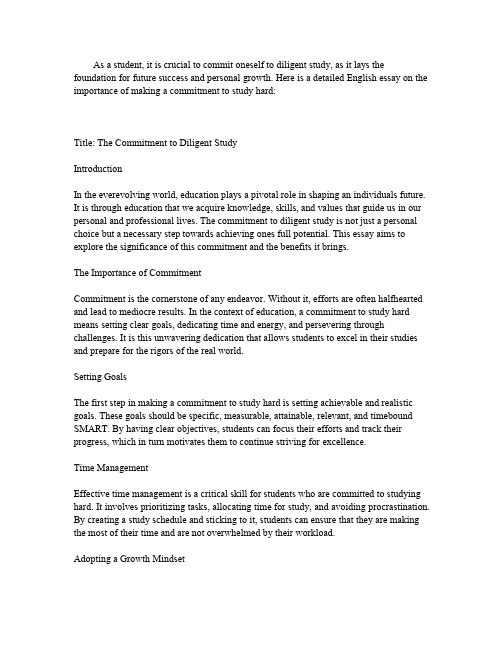
As a student,it is crucial to commit oneself to diligent study,as it lays the foundation for future success and personal growth.Here is a detailed English essay on the importance of making a commitment to study hard:Title:The Commitment to Diligent StudyIntroductionIn the everevolving world,education plays a pivotal role in shaping an individuals future. It is through education that we acquire knowledge,skills,and values that guide us in our personal and professional lives.The commitment to diligent study is not just a personal choice but a necessary step towards achieving ones full potential.This essay aims to explore the significance of this commitment and the benefits it brings.The Importance of CommitmentCommitment is the cornerstone of any endeavor.Without it,efforts are often halfhearted and lead to mediocre results.In the context of education,a commitment to study hard means setting clear goals,dedicating time and energy,and persevering through challenges.It is this unwavering dedication that allows students to excel in their studies and prepare for the rigors of the real world.Setting GoalsThe first step in making a commitment to study hard is setting achievable and realistic goals.These goals should be specific,measurable,attainable,relevant,and timebound SMART.By having clear objectives,students can focus their efforts and track their progress,which in turn motivates them to continue striving for excellence.Time ManagementEffective time management is a critical skill for students who are committed to studying hard.It involves prioritizing tasks,allocating time for study,and avoiding procrastination. By creating a study schedule and sticking to it,students can ensure that they are making the most of their time and are not overwhelmed by their workload.Adopting a Growth MindsetA growth mindset is the belief that intelligence and abilities can be developed through dedication and hard work.Students with a growth mindset are more likely to embrace challenges,persist in the face of setbacks,and see effort as the path to mastery.This mindset is crucial for those committed to studying hard,as it fosters resilience and a love for learning.The Benefits of Diligent StudyThe benefits of committing to diligent study are manifold.It not only leads to academic success but also equips students with critical thinking skills,problemsolving abilities,and a strong work ethic.These attributes are invaluable in the professional world and contribute to personal development and societal progress.ConclusionIn conclusion,the commitment to study hard is a journey that requires dedication, discipline,and a passion for learning.It is a choice that shapes ones future and contributes to the collective advancement of society.As students,it is our responsibility to make this commitment and to strive for excellence in all that we do.This essay serves as a reminder of the importance of committing to diligent study and the positive impact it can have on ones life and the world at large.It is a call to action for students to embrace the challenge of learning and to persist in their pursuit of knowledge.。
有诚意有效果的公共表达

有诚意有效果的公共表达Public expression is the process of communicating, or sending messages with the intention of conveying information to a large number of people. It can be achieved through various means such as speech, writing, and the internet. Public expression plays an important role in society by informing people about events, issues, and developments that are relevant to their life.Public expression is a powerful tool for facilitating social and political change. By passing information from one individual to another, public expression allows citizens to understand the issues that are affecting their lives. It also provides them with the tools and skills to participate in decision-making and policy creation. For example, public expression about an issue such as climate change can lead to a greater understanding of the problem and can result in the implementation of policy reforms to address it.Public expression also has the power to build public understanding. When public discourse on an issue is honest and open, it can lead to a better understanding of the opinions and perspectives of different people. It can also create an atmosphere of civility and understanding, where people can come together to discuss and debate issues in an educated and respectful manner.Public expression can also have a positive effect on the economy. By encouraging public discussion on economic issues, it can stimulate innovation, encourage investment and create jobs. Furthermore, public expression can lead to public awareness of unethical business practices as well as foster an environment of openness and accountability.Finally, public expression can be a powerful motivation for change. By facilitating dialogue among members of the public, it can create a strong sense of unity and engagement. It can also provide people with the platform to discuss their grievances and work together to find solutions. This collaboration can help build a more equitable and just society as well as increase the quality of life of citizens.In conclusion, public expression has the power to create understanding, foster collaboration and motivate change. When used properly, public expression can be a powerful tool for creating lasting social and political transformation. With the rise of technology and the internet, public expression is becoming increasingly important. By creating an open platform for discussion and debate, the public can improve their knowledge and skills, contribute their ideas and ultimately, create positive change in society.。
深思熟虑启新姿的英语作文
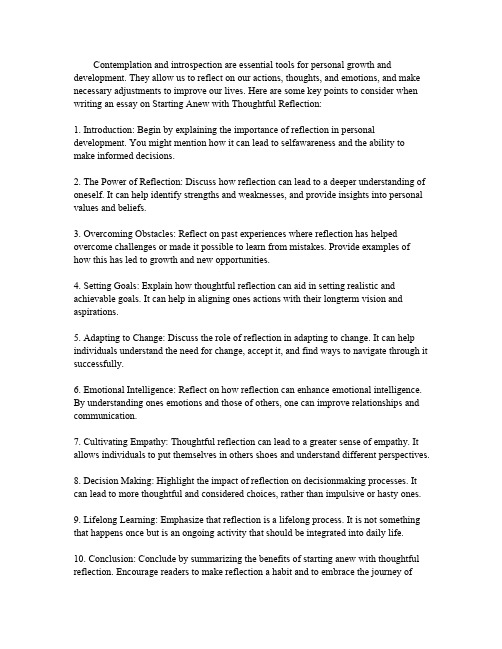
Contemplation and introspection are essential tools for personal growth and development.They allow us to reflect on our actions,thoughts,and emotions,and make necessary adjustments to improve our lives.Here are some key points to consider when writing an essay on Starting Anew with Thoughtful Reflection:1.Introduction:Begin by explaining the importance of reflection in personal development.You might mention how it can lead to selfawareness and the ability to make informed decisions.2.The Power of Reflection:Discuss how reflection can lead to a deeper understanding of oneself.It can help identify strengths and weaknesses,and provide insights into personal values and beliefs.3.Overcoming Obstacles:Reflect on past experiences where reflection has helped overcome challenges or made it possible to learn from mistakes.Provide examples of how this has led to growth and new opportunities.4.Setting Goals:Explain how thoughtful reflection can aid in setting realistic and achievable goals.It can help in aligning ones actions with their longterm vision and aspirations.5.Adapting to Change:Discuss the role of reflection in adapting to change.It can help individuals understand the need for change,accept it,and find ways to navigate through it successfully.6.Emotional Intelligence:Reflect on how reflection can enhance emotional intelligence. By understanding ones emotions and those of others,one can improve relationships and communication.7.Cultivating Empathy:Thoughtful reflection can lead to a greater sense of empathy.It allows individuals to put themselves in others shoes and understand different perspectives.8.Decision Making:Highlight the impact of reflection on decisionmaking processes.It can lead to more thoughtful and considered choices,rather than impulsive or hasty ones.9.Lifelong Learning:Emphasize that reflection is a lifelong process.It is not something that happens once but is an ongoing activity that should be integrated into daily life.10.Conclusion:Conclude by summarizing the benefits of starting anew with thoughtful reflection.Encourage readers to make reflection a habit and to embrace the journey ofselfimprovement it can initiate.Remember to use clear and concise language,provide specific examples,and maintain a logical flow throughout your essay.Personal anecdotes or quotes from experts can also add depth and credibility to your writing.。
担当守初心的英语作文
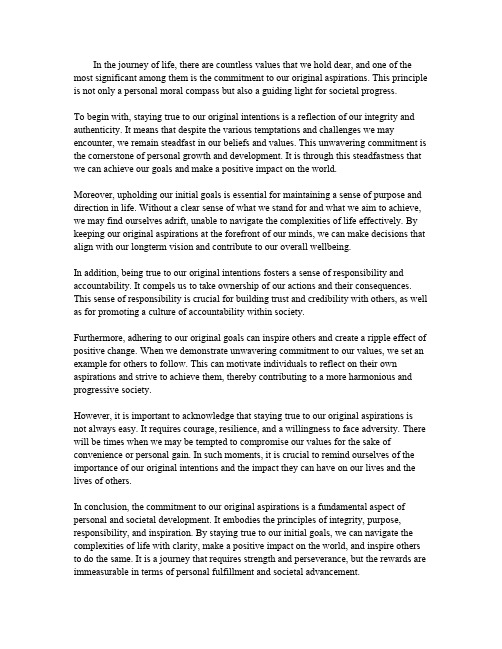
In the journey of life,there are countless values that we hold dear,and one of the most significant among them is the commitment to our original aspirations.This principle is not only a personal moral compass but also a guiding light for societal progress.To begin with,staying true to our original intentions is a reflection of our integrity and authenticity.It means that despite the various temptations and challenges we may encounter,we remain steadfast in our beliefs and values.This unwavering commitment is the cornerstone of personal growth and development.It is through this steadfastness that we can achieve our goals and make a positive impact on the world.Moreover,upholding our initial goals is essential for maintaining a sense of purpose and direction in life.Without a clear sense of what we stand for and what we aim to achieve, we may find ourselves adrift,unable to navigate the complexities of life effectively.By keeping our original aspirations at the forefront of our minds,we can make decisions that align with our longterm vision and contribute to our overall wellbeing.In addition,being true to our original intentions fosters a sense of responsibility and accountability.It compels us to take ownership of our actions and their consequences. This sense of responsibility is crucial for building trust and credibility with others,as well as for promoting a culture of accountability within society.Furthermore,adhering to our original goals can inspire others and create a ripple effect of positive change.When we demonstrate unwavering commitment to our values,we set an example for others to follow.This can motivate individuals to reflect on their own aspirations and strive to achieve them,thereby contributing to a more harmonious and progressive society.However,it is important to acknowledge that staying true to our original aspirations is not always easy.It requires courage,resilience,and a willingness to face adversity.There will be times when we may be tempted to compromise our values for the sake of convenience or personal gain.In such moments,it is crucial to remind ourselves of the importance of our original intentions and the impact they can have on our lives and the lives of others.In conclusion,the commitment to our original aspirations is a fundamental aspect of personal and societal development.It embodies the principles of integrity,purpose, responsibility,and inspiration.By staying true to our initial goals,we can navigate the complexities of life with clarity,make a positive impact on the world,and inspire others to do the same.It is a journey that requires strength and perseverance,but the rewards are immeasurable in terms of personal fulfillment and societal advancement.。
主责英语单词
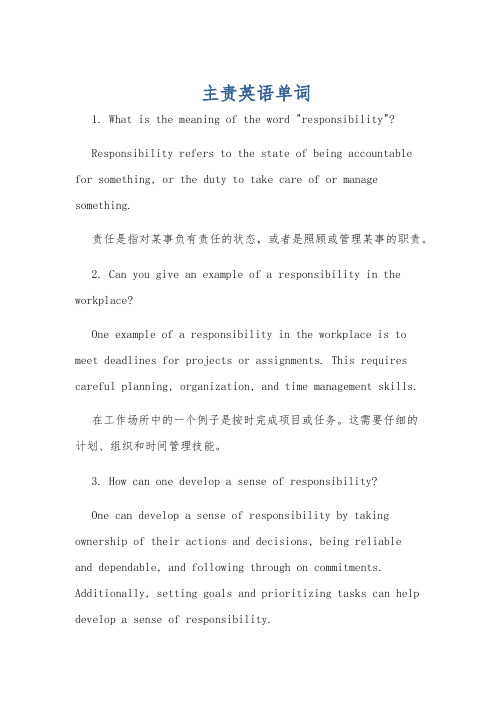
主责英语单词1. What is the meaning of the word "responsibility"?Responsibility refers to the state of being accountable for something, or the duty to take care of or manage something.责任是指对某事负有责任的状态,或者是照顾或管理某事的职责。
2. Can you give an example of a responsibility in the workplace?One example of a responsibility in the workplace is to meet deadlines for projects or assignments. This requires careful planning, organization, and time management skills.在工作场所中的一个例子是按时完成项目或任务。
这需要仔细的计划、组织和时间管理技能。
3. How can one develop a sense of responsibility?One can develop a sense of responsibility by taking ownership of their actions and decisions, being reliableand dependable, and following through on commitments. Additionally, setting goals and prioritizing tasks can help develop a sense of responsibility.通过对自己的行为和决策负责、可靠和有责任心以及兑现承诺可以培养责任感。
诚实乃上策的英语作文
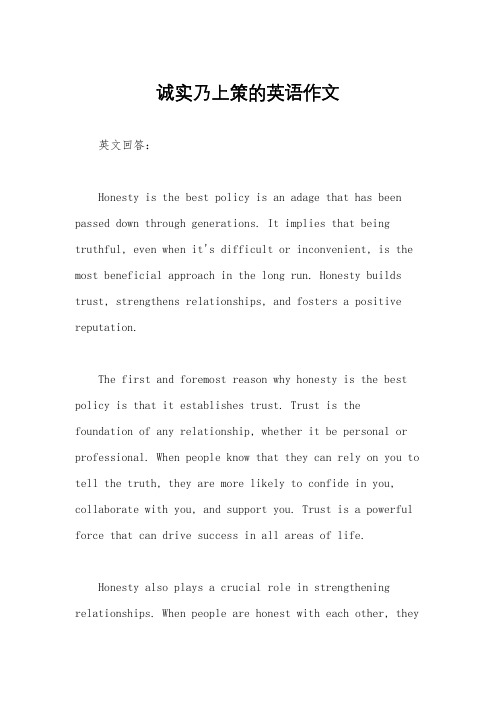
诚实乃上策的英语作文英文回答:Honesty is the best policy is an adage that has been passed down through generations. It implies that being truthful, even when it's difficult or inconvenient, is the most beneficial approach in the long run. Honesty builds trust, strengthens relationships, and fosters a positive reputation.The first and foremost reason why honesty is the best policy is that it establishes trust. Trust is the foundation of any relationship, whether it be personal or professional. When people know that they can rely on you to tell the truth, they are more likely to confide in you, collaborate with you, and support you. Trust is a powerful force that can drive success in all areas of life.Honesty also plays a crucial role in strengthening relationships. When people are honest with each other, theycreate a bond that is based on mutual respect and understanding. They are more likely to be open and vulnerable with each other, which can lead to deeper and more meaningful connections. Honesty fosters a sense of intimacy and belonging, which are essential for healthy and fulfilling relationships.Furthermore, honesty helps to build a positive reputation. People who are known for their integrity are highly valued and respected. They are seen as trustworthy, reliable, and ethical. A good reputation can open doors to opportunities, both personally and professionally. It can also provide a sense of pride and accomplishment, knowing that you are respected and admired for your honesty.In contrast, dishonesty can have severe and damaging consequences. When people lie, they erode trust, damage relationships, and harm their reputations. Trust isdifficult to rebuild once it has been broken, and relationships based on dishonesty are often doomed to failure. Moreover, dishonesty can lead to feelings of guilt, shame, and anxiety. It can also damage your self-esteem andmake it difficult to look at yourself in the mirror.Of course, there may be times when it is tempting to lie or withhold the truth. However, it is important to remember that the benefits of honesty far outweigh any potential short-term gains. Honesty is the foundation of strong relationships, a good reputation, and a clear conscience. It is the best policy for living a fulfilling and meaningful life.中文回答:俗话说,诚实乃上策。
给出重大承诺英语作文
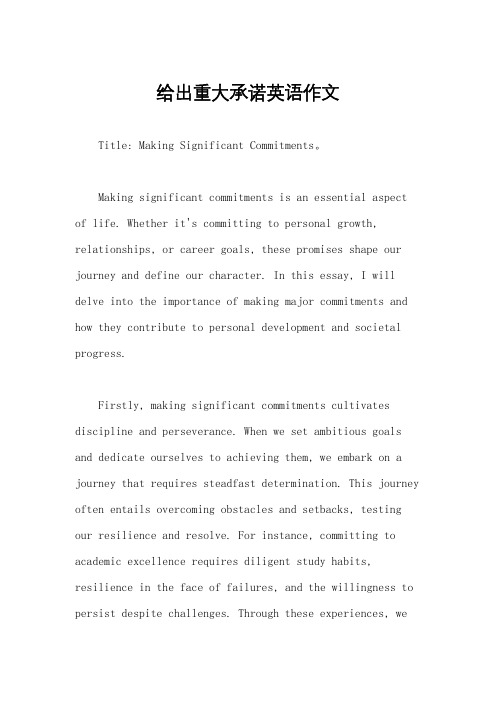
给出重大承诺英语作文Title: Making Significant Commitments。
Making significant commitments is an essential aspect of life. Whether it's committing to personal growth, relationships, or career goals, these promises shape our journey and define our character. In this essay, I will delve into the importance of making major commitments and how they contribute to personal development and societal progress.Firstly, making significant commitments cultivates discipline and perseverance. When we set ambitious goals and dedicate ourselves to achieving them, we embark on a journey that requires steadfast determination. This journey often entails overcoming obstacles and setbacks, testing our resilience and resolve. For instance, committing to academic excellence requires diligent study habits, resilience in the face of failures, and the willingness to persist despite challenges. Through these experiences, wedevelop the discipline to stay focused on our objectives and the resilience to navigate adversity.Moreover, significant commitments foster personal growth and self-discovery. When we commit to a cause or pursue a passion, we immerse ourselves in experiences that broaden our horizons and deepen our understanding of ourselves and the world around us. For example, volunteering for a humanitarian cause exposes us to diverse perspectives and challenges us to confront social injustices, fostering empathy and compassion. Similarly, dedicating oneself to mastering a skill or art form provides opportunities for self-expression and creative fulfillment, leading to a deeper sense of identity and purpose.Furthermore, making significant commitments strengthens relationships and fosters a sense of community. Whetherit's through marriage vows, friendship pacts, or professional partnerships, commitments form the foundation of trust and mutual support in relationships. By honoring our commitments to others, we demonstrate reliability,integrity, and loyalty, thereby nurturing strong and enduring bonds. For instance, in a marriage, the commitment to love and support each other through thick and thin forms the bedrock of a resilient and fulfilling partnership. Likewise, in a team or community setting, honoring commitments fosters cohesion and collaboration, enabling collective progress and success.In addition, making significant commitments contributes to societal progress and positive change. History isreplete with examples of individuals and groups who have made profound commitments to advance causes such as civil rights, environmental conservation, and scientific innovation. By dedicating their time, resources, and energy to these causes, they have catalyzed transformative change and inspired others to join their efforts. For instance, the civil rights movement in the United States was propelled by the commitment of activists who risked their lives to challenge systemic racism and advocate forequality and justice. Similarly, the global environmental movement continues to gain momentum as individuals and organizations commit to sustainable practices and advocatefor policies to mitigate climate change and protect natural ecosystems.In conclusion, making significant commitments isintegral to personal development, relationship building,and societal progress. Whether it's committing to academic excellence, personal growth, or social causes, these promises shape our identity, strengthen our connectionswith others, and contribute to positive change in the world. By embracing the challenges and opportunities that comewith major commitments, we embark on a journey of self-discovery, resilience, and purpose, leaving a lastingimpact on ourselves and the communities we inhabit.。
与尊重每份灵感有关的英语作文

Respecting every spark of inspiration is a crucial aspect of nurturing creativity and innovation.Here are some key points to consider when discussing this topic in an essay:1.The Nature of Inspiration:Inspiration can come from various sources such as nature, art,music,conversations,or even a moment of solitude.It is often fleeting and requires immediate attention.2.The Value of Spontaneity:When an idea strikes,it is important to acknowledge it, even if it seems trivial or incomplete.The initial spark can lead to profound insights or creations.3.Cultivating an Open Mind:Being open to new ideas and experiences increases the likelihood of encountering inspiration.This involves being receptive to different perspectives and being willing to step out of ones comfort zone.4.The Role of Curiosity:A curious mind is more likely to find inspiration in the mundane.Asking questions and seeking to understand the world around us can lead to unexpected discoveries.5.The Importance of Documentation:Keeping a journal,sketchbook,or digital notes can help capture those fleeting moments of inspiration.This practice ensures that no idea is lost,no matter how small or seemingly insignificant.6.The Power of Reflection:Taking the time to reflect on past experiences and ideas can reignite inspiration.Sometimes,revisiting an old thought can lead to new insights or solutions.7.The Courage to Act:Respecting inspiration also means having the courage to act on it. This might involve taking risks,pursuing a new hobby,or starting a project based on a newfound interest.8.The Influence of Environment:Creating a conducive environment that fosters creativity can help in respecting and nurturing inspiration.This could be a quiet space for writing,a welllit room for painting,or a clutterfree desk for brainstorming.9.The Support of Others:Surrounding oneself with supportive individuals who encourage and respect ones creative process can be instrumental in valuing each spark of inspiration.10.The Commitment to Growth:Recognizing that inspiration is a part of personal andprofessional growth,and committing to develop these ideas,shows a deep respect for the creative process.11.Overcoming SelfDoubt:Its essential to overcome the fear of judgment or failure that might stifle inspiration.Embracing imperfection and the iterative nature of creativity is key.12.The Legacy of Inspiration:Inspirations can lead to creations that outlive the creator, impacting future generations.Respecting each spark means acknowledging the potential for a lasting legacy.By respecting every inspiration,we not only enrich our own lives but also contribute to a culture of innovation and creativity that benefits society as a whole.。
责任于心成长的英语作文

Responsibility is a crucial aspect of personal growth and development.It is the cornerstone of maturity and a key element in building a strong character.Embracing responsibility means understanding the importance of being accountable for ones actions and decisions.Firstly,taking responsibility is about recognizing the impact of our actions on others and the environment.It involves acknowledging our mistakes and learning from them.When we make a mistake,instead of blaming others or circumstances,we should reflect on our actions and strive to make better choices in the future.Secondly,being responsible fosters a sense of discipline and commitment.When we take charge of our lives,we are more likely to set goals and work towards achieving them. This sense of purpose and determination helps us grow and develop as individuals. Moreover,responsibility nurtures empathy and compassion.By understanding the consequences of our actions on others,we become more considerate and caring.This empathy helps us build stronger relationships and contribute positively to society.In addition,embracing responsibility encourages personal growth and selfimprovement. When we take ownership of our actions,we are more likely to seek ways to improve ourselves and our circumstances.This drive for selfimprovement leads to personal development and a more fulfilling life.Furthermore,being responsible also means being reliable and trustworthy.When we are dependable,others are more likely to trust and rely on us.This trust is essential in building strong relationships,both personally and professionally.Lastly,taking responsibility helps us develop resilience and adaptability.Life is full of challenges and setbacks.When we are responsible for our actions,we learn to face these challenges headon and adapt to changing circumstances.This resilience is crucial for personal growth and success.In conclusion,responsibility is an essential component of personal growth.It helps us develop a strong character,fosters empathy,encourages selfimprovement,and builds trust.By embracing responsibility,we can navigate lifes challenges and emerge as better, more mature individuals.。
守责行更坚的英语作文
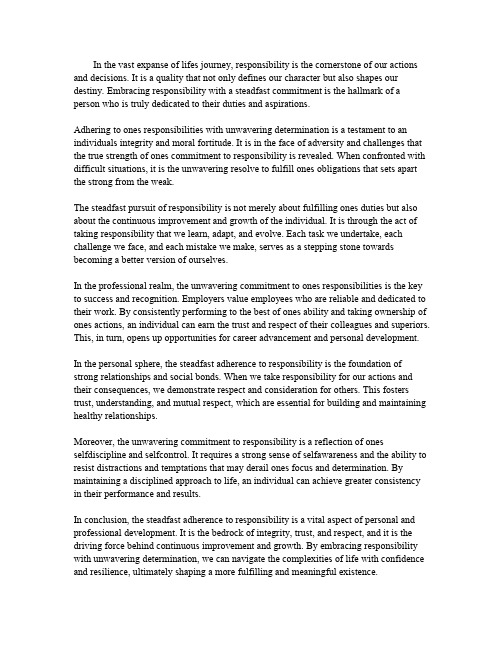
In the vast expanse of lifes journey,responsibility is the cornerstone of our actions and decisions.It is a quality that not only defines our character but also shapes our destiny.Embracing responsibility with a steadfast commitment is the hallmark of a person who is truly dedicated to their duties and aspirations.Adhering to ones responsibilities with unwavering determination is a testament to an individuals integrity and moral fortitude.It is in the face of adversity and challenges that the true strength of ones commitment to responsibility is revealed.When confronted with difficult situations,it is the unwavering resolve to fulfill ones obligations that sets apart the strong from the weak.The steadfast pursuit of responsibility is not merely about fulfilling ones duties but also about the continuous improvement and growth of the individual.It is through the act of taking responsibility that we learn,adapt,and evolve.Each task we undertake,each challenge we face,and each mistake we make,serves as a stepping stone towards becoming a better version of ourselves.In the professional realm,the unwavering commitment to ones responsibilities is the key to success and recognition.Employers value employees who are reliable and dedicated to their work.By consistently performing to the best of ones ability and taking ownership of ones actions,an individual can earn the trust and respect of their colleagues and superiors. This,in turn,opens up opportunities for career advancement and personal development. In the personal sphere,the steadfast adherence to responsibility is the foundation of strong relationships and social bonds.When we take responsibility for our actions and their consequences,we demonstrate respect and consideration for others.This fosters trust,understanding,and mutual respect,which are essential for building and maintaining healthy relationships.Moreover,the unwavering commitment to responsibility is a reflection of ones selfdiscipline and selfcontrol.It requires a strong sense of selfawareness and the ability to resist distractions and temptations that may derail ones focus and determination.By maintaining a disciplined approach to life,an individual can achieve greater consistency in their performance and results.In conclusion,the steadfast adherence to responsibility is a vital aspect of personal and professional development.It is the bedrock of integrity,trust,and respect,and it is the driving force behind continuous improvement and growth.By embracing responsibility with unwavering determination,we can navigate the complexities of life with confidence and resilience,ultimately shaping a more fulfilling and meaningful existence.。
2020年12月份英语六级作文中文题目
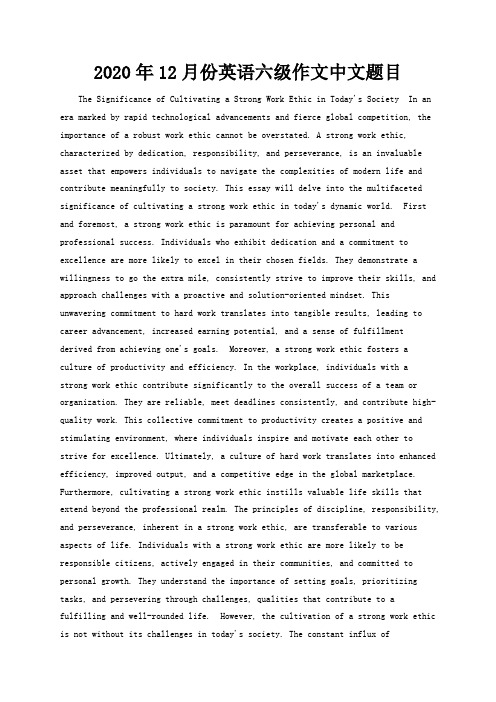
2020年12月份英语六级作文中文题目The Significance of Cultivating a Strong Work Ethic in Today's Society In an era marked by rapid technological advancements and fierce global competition, the importance of a robust work ethic cannot be overstated. A strong work ethic, characterized by dedication, responsibility, and perseverance, is an invaluable asset that empowers individuals to navigate the complexities of modern life and contribute meaningfully to society. This essay will delve into the multifaceted significance of cultivating a strong work ethic in today's dynamic world. First and foremost, a strong work ethic is paramount for achieving personal and professional success. Individuals who exhibit dedication and a commitment to excellence are more likely to excel in their chosen fields. They demonstrate a willingness to go the extra mile, consistently strive to improve their skills, and approach challenges with a proactive and solution-oriented mindset. This unwavering commitment to hard work translates into tangible results, leading to career advancement, increased earning potential, and a sense of fulfillmentderived from achieving one's goals. Moreover, a strong work ethic fosters aculture of productivity and efficiency. In the workplace, individuals with astrong work ethic contribute significantly to the overall success of a team or organization. They are reliable, meet deadlines consistently, and contribute high-quality work. This collective commitment to productivity creates a positive and stimulating environment, where individuals inspire and motivate each other tostrive for excellence. Ultimately, a culture of hard work translates into enhanced efficiency, improved output, and a competitive edge in the global marketplace. Furthermore, cultivating a strong work ethic instills valuable life skills that extend beyond the professional realm. The principles of discipline, responsibility, and perseverance, inherent in a strong work ethic, are transferable to various aspects of life. Individuals with a strong work ethic are more likely to be responsible citizens, actively engaged in their communities, and committed to personal growth. They understand the importance of setting goals, prioritizing tasks, and persevering through challenges, qualities that contribute to afulfilling and well-rounded life. However, the cultivation of a strong work ethic is not without its challenges in today's society. The constant influx ofinformation, the allure of instant gratification, and the increasing prevalence of distractions can hinder the development of a strong work ethic. Moreover, societal pressures and unrealistic expectations can lead to burnout and a decline in motivation. Therefore, it is essential to foster an environment that values and encourages a strong work ethic, while also promoting work-life balance and mental well-being. To effectively cultivate a strong work ethic, it is crucial to start early in life. Educational institutions play a vital role in instilling the importance of hard work, discipline, and a commitment to excellence in young minds. By providing opportunities for students to engage in challenging tasks, fosteringa culture of responsibility, and celebrating achievements, educationalinstitutions can lay the foundation for a strong work ethic that will benefit individuals throughout their lives. In conclusion, a strong work ethic is an indispensable asset in today's dynamic and competitive world. It empowersindividuals to achieve personal and professional success, fosters a culture of productivity and efficiency, and instills valuable life skills that extend beyond the workplace. While challenges exist in cultivating a strong work ethic, its benefits are undeniable. By prioritizing hard work, dedication, and perseverance, individuals can unlock their full potential and contribute meaningfully to society.。
责任与担当的体现英语作文
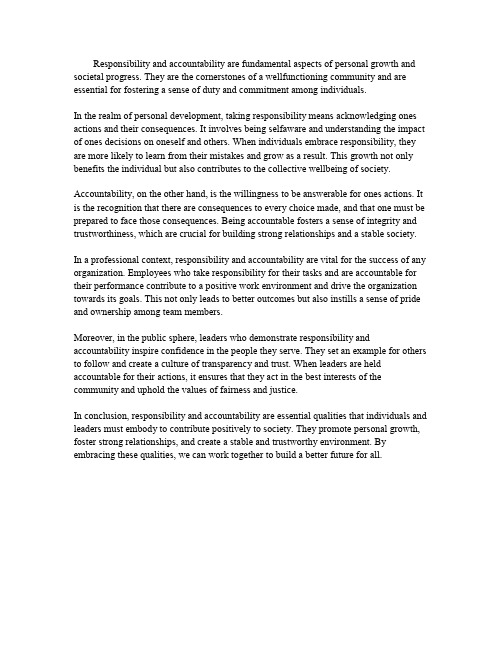
Responsibility and accountability are fundamental aspects of personal growth and societal progress. They are the cornerstones of a wellfunctioning community and are essential for fostering a sense of duty and commitment among individuals.In the realm of personal development, taking responsibility means acknowledging ones actions and their consequences. It involves being selfaware and understanding the impact of ones decisions on oneself and others. When individuals embrace responsibility, they are more likely to learn from their mistakes and grow as a result. This growth not only benefits the individual but also contributes to the collective wellbeing of society.Accountability, on the other hand, is the willingness to be answerable for ones actions. It is the recognition that there are consequences to every choice made, and that one must be prepared to face those consequences. Being accountable fosters a sense of integrity and trustworthiness, which are crucial for building strong relationships and a stable society.In a professional context, responsibility and accountability are vital for the success of any organization. Employees who take responsibility for their tasks and are accountable for their performance contribute to a positive work environment and drive the organization towards its goals. This not only leads to better outcomes but also instills a sense of pride and ownership among team members.Moreover, in the public sphere, leaders who demonstrate responsibility and accountability inspire confidence in the people they serve. They set an example for others to follow and create a culture of transparency and trust. When leaders are held accountable for their actions, it ensures that they act in the best interests of the community and uphold the values of fairness and justice.In conclusion, responsibility and accountability are essential qualities that individuals and leaders must embody to contribute positively to society. They promote personal growth, foster strong relationships, and create a stable and trustworthy environment. By embracing these qualities, we can work together to build a better future for all.。
- 1、下载文档前请自行甄别文档内容的完整性,平台不提供额外的编辑、内容补充、找答案等附加服务。
- 2、"仅部分预览"的文档,不可在线预览部分如存在完整性等问题,可反馈申请退款(可完整预览的文档不适用该条件!)。
- 3、如文档侵犯您的权益,请联系客服反馈,我们会尽快为您处理(人工客服工作时间:9:00-18:30)。
98M.P.SINGH out as part of praxeology,the study of the notions of agency and activity(1968, pp.12–13).What we propose here may be thought as social praxeology.Ross motivates the notion of prima facie duties as an alternative to a purely utilitarian view of ethics(1930,pp.16–22).He develops a range of reasons for such duties,including previous acts such as one’s promises or failures resulting in repa-ration to others,beneficence and nonmaleficence,self-improvement,and justice. Our approach captures similar intuitions through the notion of commitments and metacommitments.We propose a framework called spheres of commitment,which incorporates intuitions from information systems to marry commitments with the organizational structure of heterogeneous multiagent systems.Our approach moti-vates a rich“descriptive ontology”of commitments—to use Castelfranchi’s term (1995)—that emphasizes the interplay between commitments and social structure. It defines operations on commitments and groups,distinguishes implicit and ex-plicit commitments,and models social policies as higher-order commitments.To help appreciate our approach,wefirst lay out our main conceptual assumptions:A1.Agents can be structured,and are recursively composed of heteroge-neous individuals or groups of agents(Singh,1991a).A2.Agents are autonomous,but constrained by commitments—or we would have chaos.A3.Social commitments cannot be reduced to internal commitments, which apply within an agent—the relationships among these conceptscannot be definitional(Singh,1991b).mitments are,in general,revocable;the clauses for revoking them are as important as the conditions for satisfying them.mitments arise,exist,are satisfied,revoked,or otherwise manip-ulated,all in a social context.mitments not only rely on the social structure of the groups in which they exist,but also help create that structure.A7.The semantics of commitments must be distinguished from the prag-matics;what commitments are is very different from how they areused by agents—it is methodologically critical that the semantics doesnot replace the pragmatics,or vice versa.A8.The subjectivist bias of traditional AI must be avoided—commitments and associated conditions are evaluated in the world,not in the mind of any agent,unless of course they refer to an agent’smental state(Singh,1991b;Castelfranchi,1995).AN ONTOLOGY FOR COMMITMENTS IN MULTIAGENT SYSTEMS99 The above assumptions are crucial to developing a powerful framework for com-mitments that can handle the normative concepts in general.For example,many agents are“corporate individuals,”to use a term due to Hobbes.The agents are autonomous,but not recklessly so.The commitments they enter into are frequently canceled.However,the creation and cancelation of commitments occurs relative to the prevailing social stly,although commitments obviously have a lot to do with the agents’minds,one can speak of their satisfaction or violation independent of any agent.We believe that assumptions A4,A5,A6,and A7have not received sufficient attention in the multiagent literature;similarly,assumptions A5,A6,and A7have not been emphasized in previous work in ethics and legal reasoning.Therefore, this paper will concentrate on defending and using these assumptions.The goals of this paper are to lay out some of the foundational aspects of commitments and associated concepts of groups,organizational structure,and roles.These aspects are then shown to capture many of the key properties of related normative concepts.A part of the challenge,of course,is that normative concepts involve a variety of meanings.For example,Edel identifies13readings of“obligation”in the literature on ethics(1961,p.328).This means that our ontology must be expressive enough to accommodate a wide variety of intuitions.Section2introduces the key ideas in our ontology of commitments.Section3 introduces spheres of commitment using social policies and structure.Section4 casts some normative concepts into our framework.Section5reviews some of the relevant literature.Section6concludes with a discussion of some outstanding issues.mitmentsIn order to carry out our program,we need a concept that can serve as a reasonable foundation.We employ social commitment as this concept.However,in order to succeed with our program,we need to take a somewhat broader notion of commit-ment than is taken by other—to our mind,valuable—approaches,such as those of Castelfranchi,von Wright,and Segerberg.However,in our previous work,we have long taken a broader interpretation than the rest of the literature(Singh,1991b).A pleasant side-effect of taking a broader interpretation is that it helps in unifying several important normative concepts.We will follow our program here,and defer a detailed discussion of the literature till section5.Our approach treats commitments asfirst-class abstract objects with names (Asher,1993).Naming enables self-and cross-reference among the commitments. We think of commitments as being toward conditions to be achieved rather than ac-tions.In this way,we borrow from the tradition of von Wright(1963),continued in philosophy by Segerberg(1989)and common in much computer science research on actions and intentions,e.g.,our own previous work(Singh,1994).However,100M.P.SINGH conditions correspond to high-level ing conditions facilitates nestingcommitments and constructing“higher-order”commitments(defined below).An agent’s commitments typically constrain him to act in accordance withthem.A commitment is discharged when the desired condition is obtained.Thiscondition might be a plain physical requirement,or a requirement that some otheragent recognizes that some physical requirement is satisfied.To avoid subjectivism,we require that the discharge condition of a commitment be evaluated objectively.However,the condition may explicitly involve the beliefs or other mental statesof agents.For example,it is possible to commit to“making the sky green,”or to“making the sky appear green to the creditor”—these are different commitments,with different requirements of satisfiability.Although agents normally act in accordance with their commitments,theysometimes cannot or would not do so.Thus,some commitments must be canceled.Indeed,in most settings and applications where agents and multiagent systemsare useful,inflexibility is undesirable and the agents must retain some autonomybeyond their commitments.However,commitments should not be canceled arbi-trarily,because that would subvert their very purpose.A challenge is to reconcilethe apparent tension between these requirements.2.1.FORM AND CONTENT OF COMMITMENTSBased on the foregoing,we propose the following abstract representation for com-mitments.In the remainder of this paper,we use a formal language based looselyon the predicate calculus with special predicates for commitments,etc.We use →as a material conditional,and⇒as a strict conditional.We neglect temporal aspects for simplicity.We do not define the semantics formally,but state constraintson how the various predicates and operators relate to one another. DEFINITION1A commitment is a four-place relation involving a proposition (p)and three agents(x,y,and G).Let c=C(x,y,G,p)denote a commitment from x toward y in the context of G and for the proposition p.Then,x is the debtor, y the creditor,G the context group,and p the discharge condition of commitment c.Here,the debtor is the agent who is committed,and the creditor is the agentwho receives the commitment.The creditor need not be the direct beneficiary.Forexample,in Japanese society,obligations to one’s children(beneficiaries)are re-payment of debts to one’s parents(creditors)(Edel,1961,p.330).However,we willassume that the creditor can be treated as the beneficiary for all practical purposes.We revisit this assumption in section5.The discharge condition is the condition committed to.Each commitment existsin a(social)context.Intuitively,the context includes the norms or conventions that apply in the group in which the commitment is instantiated.It provides the court of appeals for adjudicating disputes between the debtor and creditor.AN ONTOLOGY FOR COMMITMENTS IN MULTIAGENT SYSTEMS101 Formally,the context is a group that contains the participating agents,usually in different roles.Groups in general,and context groups in particular,arefirst-class agents in our framework.Morse mentions in passing how the public may be treated as a plaintiff,i.e.,an agent,in law(1995a,p.227).The idea that the group of agents has sovereignty over its members is basic to democracies.Also,in democracies,the group collectively delegates its powers to its representative,the government—typically,itself a group(Morse,1995a,p.221).Previous approaches to commitments have only looked at context-sensitivity with respect to propositions that define potential exception conditions.For ex-ample,you may be obliged to lending someone your car,but not if he is drunk. However,there is also a component of the context that is purely social.This is the component that we emphasize by identification of the context group in our definition.2.2.OPERATIONS ON COMMITMENTSOur descriptive ontology includes the following operations on commitments.O1.Create instantiates a commitment;it is typically performed as a con-sequence of an agent adopting a role or by exercising a social policy(explained below).O2.Discharge satisfies the commitment.We postulate that discharge is performed concurrently with the actions that lead to the given con-dition being satisfied.In this manner,the actions that realize thedischarge condition generate the discharge action(Goldman,1970).O3.Cancel revokes the commitment,subject to the cancelation clause of the commitment and the policies in effect in the given group.O4.Release essentially eliminates the commitment.This is distinguished from both discharge and cancel,because release does not mean suc-cess or failure of the given commitment,although it lets the debtor offthe hook.The release action may be performed by the context or thecreditor of the given commitment.O5.Delegate shifts the role of debtor to another agent within the same context,and can be performed by the new debtor or the context.O6.Assign transfers a commitment to another creditor within the same context,and can be performed by the present creditor(if authorized)or the context.Interestingly,except for discharge,these can be,and typically are,performatives (Austin,1962)of the debtor,creditor,or context.This is because the debtor can102M.P.SINGH unilaterally create or cancel commitments by performing the right illocutions(un-der appropriate circumstances),but cannot always discharge a commitment by just saying so.As a reviewer correctly pointed out,the commitment can be to perform a communicative act,in which case it can be discharged by a performative.But there is a nesting of the actions in such a case.We use the names of the operations as predicates in our language.Thus, cancel(x,c)denotes a proposition,which is true precisely when agent x cancels commitment c.This presupposes that x is the debtor of c.3.Spheres of CommitmentWe postulate two kinds of agents:named individuals and named groups.Individ-uals are unstructured;groups are constructed from individuals or other groups by specifying a social structure.By naming groups we can allow their membership to change while maintaining a constant identity.This enables us to talk of the commitments relating to such agents.The same set of agents may form different groups,potentially with different structures.A sphere of commitment(SoCom)is a group viewed in conjunction with its roles and their concomitant commitments. 3.1.STRUCTUREWe consider the following operations with respect to groups.A group may be created;an agent may adopt a role;an agent may reassign himself to another role; an agent may exit a group.Not all of these operations may be enabled or voluntarily performed,of course.For example,in a caste-based society,each agent is assigned a role automatically and cannot change a role or exit the society,except by death. Most current applied multiagent systems are similar!There is,of course,research into societies defined in terms of agents playing different roles,and entering or exiting roles to reorganize societies.For example,Glaser and Morignot(1997) study reinforcement learning for reorganizing societies,although they do not focus on commitments per se.3.1.1.Explicit versus ImplicitWe previously proposed that the structure of a group is given by the constraints on the interactions among its roles(Singh,1991a).We elaborate the interactions some-what differently now.We distinguish two main kinds of commitments—explicit and implicit—which are intimately related to two main kinds of interactions, termed strategic and reactive in(Singh,1991a).Explicit commitments are ex-plicitly represented by one or more of the agents;implicit commitments are not. Consequently,explicit commitments can feature in the agents’communications. Intuitively,implicit commitments are those that the agents do not need to articulate, but which are implicitly common knowledge(or mutually believed)in the system. This is important,because the only kind of common knowledge in a real system isAN ONTOLOGY FOR COMMITMENTS IN MULTIAGENT SYSTEMS103 what is present without having to be created by communications(Chandy&Misra, 1986).Explicit interactions rely for their meaning upon explicit commitments among the communicating agents.Consider the different classes of illocutionary acts (Austin,1962;Searle,1969).For example,commissives ordinarily bring into effect a commitment by the speaker to the hearer.This commitment is as much of a commitment as any other that the speaker may have.Indeed,we strongly agree with Castañeda,when he states that“each act of promising is an act of the same type as an act or process of enactment of a law”(1975,p.181).Directives presuppose a commitment by the hearer to do as told;in order to succeed,they lead to a specific commitment by the hearer.Assertives commit the speaker to the statement expressed.Permissives make the speaker committed to allowing the relevant condition to hold or to specifically release a prior commitment of which the speaker is the creditor or context group.Implicit interactions rely for their meaning upon implicit commitments.The implicit commitments correspond to“habits”of interaction that lead to the observed—arguably,the“correct”—behavior of the system without necessarily any explicit representation or reasoning by the interacting agents.An example is a commitment not to break into a line at a bus stop.There is of course afine line between implicit and explicit commitments,because implicit ones can become explicit when discussed.But the distinction is conceptually and practically an important one to maintain.3.1.2.Flow downEach role comes with its commitments.In some cases,the commitments that an agent acquires because of adopting a particular role can be overridden,possibly by commitments acquired through another role.However,in some cases,they cannot—the agent must give up the original role or exit the original group in order to be released from the commitments that came with the original role.We call this situation theflow down of commitments.Flow down is related to conflict of interest situations in which an agent has somehow ended up with conflicting roles. For example,an agent may not be able to carry out the commitments of the manager role if one of the staff being managed is his son.3.2.POLICIESSocial policies are conditional expressions involving commitments and actions on commitments.Social structure and social policies are two faces of the same coin. The former applies within a group;the latter apply across agents,including those who constitute a group.104M.P.SINGHDEFINITION2A formal expression is0-order iff it does not refer to a com-mitment,and is(i+1)-order iff the highest order commitment it refers to is i-order.DEFINITION3A commitment c=C(x,y,G,p)is i-order iff the order of p is i.Consequently,policies for i-order commitments are(i+1)-order expressions. Policies have a computational significance,which is that they can lead to executing various operations on commitments,even without explicit reference to the context group.It is their locality that makes policies useful in practice.Policies may apply to each of the operations on commitments that were de-fined above.In fact,policies on the operations are routine ways of specifying the constraints on a given commitment or class of commitments.To simplify the presentation,we use the term release policy,etc.to refer to a social policy that applies to the performance of a release(or other appropriate)operation on the given commitment.In a previous version,we included an explicit cancelation clause as part of the definition of commitment.The cancelation clause was the enabling condition under which the commitment could be canceled.Setting it to false made the commitment irrevocable;setting it to true allowed the commitment to be given up at will.Most interesting cases lie in between,e.g.,setting the cancelation clause of commitment c to canceled(c )means that commitment c must be canceled in order to cancel c.We retain the same intuitions in the present version.However,for reasons of elegance and to simplify the definition,we now treat cancelation just like any other operation on commitments.Thus,a cancelation clause of the previous version shows up as a cancelation policy now.3.3.NORMATIVE VERSUS NON-NORMATIVE POLICIESSocial policies are policies on commitments.They may or may not be shared by all agents,and they may or may not be norms of the given society.It is possible to have non-normative policies.For example,an agent,x,might adopt a policy of being altruistic,which might be realized as adopting commitments based on requests. Thus we have(∀y,G,p:y∈G→C(x,y,G,q)),where q (request(y,x,p)⇒create(x,C(x,y,G,p))).Now when some agent y requests that x bring about or perform p,x adopts a commitment for p.However,x is not committed to any other agent to be altruistic,and it is not a social norm in this society that x be altruistic.However,in most interesting cases,social policies are norms.In such cases,they are themselves commitments of the agents.A normative situation related to the above example is when xfills a specific role in group G,where the designated role is supposed to be altruistic toward the other members of G.In that case,x would have a commitment to be altruistic.That is,we have a higher-order commitment C(x,G,G,(∀y,p:y∈G→C(x,y,G,q))),where the discharge condition ofAN ONTOLOGY FOR COMMITMENTS IN MULTIAGENT SYSTEMS105 this commitment is precisely the policy of altruism given above.Similar policies can be defined where the debtor is the context group,and the discharge condition is performing an action such as release of a commitment.4.Relating Normative Concepts and CommitmentsWe now discuss the relationships between commitments as we understand them, and traditional concepts that occur in the literature.4.1.TRADITIONAL CONCEPTSWe now refer back to some pretheoretic normative notions,and show how they can be mapped to the concepts introduced above.These notions are informal,or at least understood in different ways by different authors.We give an example after the enumeration.N1.Pledge.Since commitments in our framework are more powerful than usual,we also identify a pledge as an explicit commitment.Pledge,in this sense,is a commitment,not a commissive performative.Inother words,P(x,y,G,p) (∃c:c=C(x,y,G,p)&explicit(c)).In general,all six operations are allowed on pledges.Pledges areoften,but not always,the result of commissive performatives—theycan also arise through conventions or other kinds of higher-levelcommitments.N2.Ought.We believe that the classical approaches in deontic logic, which express ought in absolute terms,are unsuitable,because oughtis inherently contextual.By contrast,we analyze ought as relativizedto the context group—thus ought corresponds to a commitment whosecreditor is identified with its context group,and whose cancelationpolicy is set to false.That is,O(x,G,p) (∃c:x∈G&c=C(x,G,G,p)).We can,of course,also represent the traditional deontic ought,al-though we do not approve of it.That is,O d(x,p) (∃G:x∈G&O(x,G,p)).O d(x,p)flows down.Interestingly,ought s cannot be canceled,delegated,or assigned.Tra-ditionally,cancelation is effected through the use of conditional ordyadic obligations.O(x,G,p)can be released by its context—inthis way,the context encodes the exception conditions.However,O d(x,p)cannot be released—it lacks both a context and a cred-itor.The above definition respects Castelfranchi’s syllogism that acommitment implies that the debtor ought to discharge it(1995).106M.P.SINGH N3.Taboos are implicit0-order commitments relative to a context.That is,T(G,p) (∀x∈G:(∃c:c=C(x,G,G,¬p)&implicit(c)&order(c,0)&(cancel(x,c)⇒false))).Taboos apply uniformlyto all members of a group.They are implicitly created and must bedischarged—no other operation applies,and they cannot be overrid-den.Not satisfying them can lead to excommunication from the givengroup.Taboos,being implicit,are not talked about in the group.N4.A convention or custom is also relativized to a context and cred-itor,but is implicit.We require conventions to be higher-order,because they lead to lower-level commitments when exercised;the resulting commitments may be explicit or implicit.That is,Conv(G,p) (∃c,∃i,∀x∈G:c=C(x,G,G,p)&implicit(c)&order(c,i)&(cancel(x,c)⇒false)&i>0).We dis-tinguish conventions from taboos in that they typically lead to otherlower-order commitments.An example of a convention is alwaysresponding to whoever communicates with you.N5.A collective commitment of a group of agents may be defined as the conjunction of the commitments of the individuals to the group,inthe context of the same group,and which can be given up only ifthe members mutually believe that it is impossible.Dunin-Keplicz&Verbrugge study this and related notions,also summarizing someprevious work(1996).Mutual belief in a group that q holds meansroughly that each member of the group believes q,and that the oth-ers believe q,and so on,to arbitrary levels of nesting(Fagin et al.,1995).(Barwise(1989a)compares three alternative formulations ofmutual beliefs,but these are essentially similar for our purposes.)Here we use MB to notate mutual belief.Neglecting temporal aspects,we have Coll(G,p) (∀x∈G:C(x,G,G,p)&(cancel(x,c)⇒MB(G,¬p))).N6.In our understanding,obligation has two main readings:(a)one close to pledge,and(b)the other close to ought.Therefore,we shall notdiscuss it separately.In the above manner,our approach can model several normative concepts in a unified framework.These concepts may involve mental states as in N5above, or may not.Theflexibility of our approach can enable a declarative specification of the normative behavior of multiagent systems in a variety of applications.To use an example suggested by a reviewer,suppose Andy accidentally damages my car in a parking lot.If I had lent him the car,there might be an explicit pledge from him to repair any damage.If not,he might follow the convention in our society that he should repair the stly,Andy might satisfy the personal requirementAN ONTOLOGY FOR COMMITMENTS IN MULTIAGENT SYSTEMS107 that“good people ought tofix whatever they damage,”which can lead him to adopt the lower-order commitment to perform the repairs.This is Andy’s policy,but may not be a norm in our,let’s say aggressive,society.4.2.HOHFELDIAN CONCEPTSThe concepts in N7,N8,N9,and N10are due to Hohfeld(1919),and carry a clearer meaning in the literature.In the following,G is a group corresponding to the entire society or a legally relevant subset thereof,such as a city or a county.N7.A claim or right is what an agent can demand from another.It is likea commitment with respect to the relevant context,which is not madeexplicit by Hohfeld.Thus,we have Claim(x,y,p) C(y,x,G,p).N8.A privilege is a freedom an agent has from claims of another.In other words,it is an absence of a duty to refrain from the given act.In thissense,a privilege is the dual of a claim with the roles of the agentsreversed,i.e.,Priv(x,y,p) ¬Claim(y,x,¬p).N9.A power refers to the ability of an agent to force(if he so desires) the alteration of a legal relation in which the other agent participates.Thus,we have Power(x,y,r) C(G,x,G,request(x,G,r)⇒perform(G,r)),where r is an operation on commitments whose cred-itor or debtor is y,and context group is G.In other words,x hasthe power to alter y’s legal relations by requesting the context toperform an operation that changes the relevant legal relations of y.Examples of such changes include taking away property belonging toy or granting him property he didn’t previously have.N10.An immunity means a freedom from the power of another agent.Thus, Immunity(x,y,p) ¬Power(x,y,¬p).The concepts in N7,N8,N9,and N10are the core Hohfeldian concepts.Our terminology follows Kanger in using claim for right,and exposure for no-right (1971).The correlate of a concept is obtained by switching the roles of x and y in its definition.Duty,exposure,liability,and disability are the correlates of claim, privilege,power,and immunity,respectively.The above definitions support the observation that claim and privilege,and power and immunity are duals of each other with the roles of the agents reversed.Our definition of power bases an agent’s ability to change legal relations on the corresponding and primary such power vested with the context group.This reflects our philosophical assumption of the ultimate power of the context group. By showing power and immunity as affirming or negating metacommitments,we also reflect the legal intuition that claim and privilege are a more direct component108M.P.SINGH of Hohfeld’s analysis than power and immunity,a point made by Fuller,cited in (Morse,1995a,pp.244–245).Hohfeld argued that“strictly fundamental legal relations”cannot be satisfac-torily formalized(p.36).We showed how these fundamental relations can be replaced by the single one of commitment,which although not formally defined can help unify the definitions of the others.4.3.NORMS AND COMMITMENTSSo,when all is said and done,how do norms relate to commitments?In our view, commitments—of order greater than0,i.e.,metacommitments—create a society. The metacommitments are the norms of this society.In the context provided by this society,lower-level commitments are instantiated due the actions of the differ-ent agents,leading to cohesive interactions among them.Some of the lower-level commitments—if they are metacommitments—would themselves be norms.How-ever,these can also be social policies(adopted by different agents)that are not norms.For example,the altruistic agent of section3.3acquires commitments based on his personal policy.In this way,commitments can arise as duties of justice and kindness,or even self-improvement described by Ross.Consequently,we believe we have supported the thesis that commitments are both the progenitors and the descendants of norms.However,they are not exclusively the descendants of norms.5.LiteratureAs should be clear by now,our work seeks to synthesize ideas from multiagent systems on the one hand,and ethics and legal reasoning on the other.We made some allusions to the literature in the foregoing,but we discuss some important works in more detail below.5.1.MULTIAGENT SYSTEMSAlthough much research has been performed on commitments and social relations, for reasons of space,we shall compare our approach primarily to Castelfranchi (1995),who also considers multiagent system issues.We share many intuitions with Castelfranchi,but emphasize them to different degrees.In particular,we agree on the limited autonomy of agents,their dependence relations with each other,the irreducibility(in general)of social concepts to mental concepts,and the norma-tive nature of roles.However,Castelfranchi requires stronger relationships among these concepts,which we believe can hold only in specific cases.For example,he requires that the creditor have the committed condition as a goal,and further that this is mutually known to the creditor and debtor.In addition,the creditor should commit to accepting the commitment.。
